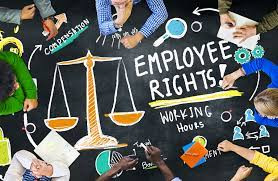
Let’s go legal for a change. Imagine a workplace where employees have their fundamental rights protected and entirely respected, where unfair labour practices are not the prevailing culture and where everyone works fairly and are not affected by incidental matters related to their rights being violated. Where trust, cooperation accountability and equity are the predominant modes of operation. There are various rights of employees that must be respected as provided for by the Labour Act, [Chapter 28:01] which is an Act that declares and defines fundamental workers’ rights and that gives effect to the International obligations of the International Labour Organisation and by the constitution of Zimbabwe. We are going to explore the issues of sexual abuse, exploitation, and wage theft in Zimbabwe.
Wage theft occurs in both the public and private sectors in Zimbabwe. This problem then affects the rights to representation as workers then struggle to pay their subscriptions to relevant unions or trade representatives, this affects things like collective bargaining. as the employee is lost and left stranded on their own. In our country where formal employment is minimal, the affected workers cannot effectively fight wage theft in fear of the obvious. The situation becomes dire as it cultivates the cycles of poverty, economic struggle, hunger etc. affecting the family life of an ordinary citizen. Wage theft impoverishes workers who, under other circumstances are the bedrock of the middle class. It forces families to dismantle and drift as they devise coping strategies that can tear family ties, make difficult choices and gamble with their future. Wage theft disempowers and robs workers of dignity. The inability to support one’s family through work strips one of their honour and dignity, purpose and leads to embarrassment. The ZCTU (Zimbabwe Congress for Teachers Union), (NEC) National Employment Council and other various unions deal with employee rights and representations in the workplace in Zimbabwe.
To show the seriousness of this matter, the new constitution of Zimbabwe Amendment (No.20) Act 2013 embodies the enshrinement of the right of employees to be paid a fair and reasonable wage under s 65(1) and s 12A of the Labour Act [Chapter 28:01] provides for remuneration of workers. Zimbabwe already is in a serious wage crisis toppled with 7.9 % unemployment rate according to the Take-Profit.Org statistics as of 2023.
Already leaving the other employed population desperate for work and to earn a living. Now it is that desperation that paves way for wage theft with people continuing to go to work just for the name of being employed, to only use the resources at work or with the faint hopes of searching for something else or for other employment. Whether or not this is an economic problem or simply the employers taking advantage of the known situation is an issue we leave to your own judgement.
Sexual Harassment in the workplace is very common and most workers are knowledgeable about it. The Labour Act [28:01] s 8(h) identifies sexual harassment as unwelcome sexually determined behaviour towards any employee, whether verbal or otherwise, such as making physical contact or advances, sexually coloured remarks, or displaying pornographic materials in the workplace. Victims of this type of harassment are predominantly women. Under the same bracket, we find the evil of sexual exploitation which is defined as an act of indulgence with someone sexually and physically and the victims tolerate this owing to the position of the abuser, victims are also asked for sexual favours from their superiors in exchange for promotions or job opportunities. This exploitation then gives the employer or senior work official untamed power to control, manipulate and take advantage of the poor employee sexually, a sad and dangerous survival game.
What happened to working earnestly and being given the fair chance to rise up the ranks without degrading one’s body and crushing their image? The victims are then placed at a sad position of choosing to survive or die, faced with their fears to lose a source of income, they continue to defile their bodies.
They are told a lie that it is for their own good and that they gain financially and favours at work, which is nothing compared to the psychological and physical damage they have to deal with. Studies have shown that most of the victims of sexual abuse and exploitation will not share their ordeal with anyone, with their mental statuses affected as well, they keep it moving and live with the unfair ordeals.
Sadly, the afore mentioned are workplace misconducts and unfairness that have over the years, been slowly adopted and accommodated in various work spaces, it then has become the silent organisational culture. With not much options and courage on their side, the victims continue to work on auto pilot, with their dignity and pride stripped. In other instances, the tone is there even upon interview stage and a potential employee gets hinted by the potential employer on the silent organisation culture, with a clear attitude to pounce on the poor potential employee as soon as they are employed.
- ZRBF rescues hunger-prone communities
- ZCTU and ILO turn blind eye to pensioners’ plight
- Zupco on cusp of collapse
- Underpaid ZBC workers seek ED’s intervention
Keep Reading
The two outlined workplace abuses of rights lead to a serious sad case of ‘zombie employees’, with the employer or management continuously committing wrong and treating their employees unfairly.
We then have certain employees, unhappy, disengaged at work, and people genuinely not liking their jobs but merely putting up so they can survive and feed themselves. There is a serious need for employee engagement solutions in the workplace. Over and above the employee focusing on themselves they must seriously consider the betterment of their people, after all employees are the company’s biggest assets.
The PSC (Public Service Commission) notably, together with the UNDP (United Nations Development Programme) undertook a study in 2020 that assessed knowledge, attitudes, and perceptions towards sexual harassment within the Public Service and came up with the findings to draw a sexual harassment policy which was then launched in July 2022. This was to ensure that the Public Service workplace is free from sexual harassment, exploitation, and abuse, protecting the dignity of workers and promoting productivity.
The introduction of this article prompts the reader to imagine a particular workplace, a healthy workspace that upholds the value and rights of people…now after reading all this, dear reader, whoever you are in the workplace and whatever role you play as such, go and do your best, stop imagining now, go and implement change, it starts with you seriously! Let’s protect and uphold fundamental human rights in the workplace.
*Bhekilizwe Bernard Ndlovu’s training is in human resources training, development and transformation, behavioural change, applied drama, personal mastery and mental fitness. He works for a Zimbabwean company as human capital executive, while also doing a PhD with Wits University where he looks at violent strikes in the South African workplace as a researcher. Ndlovu worked as a human resources manager for several blue-chip companies in Zimbabwe and still takes keen interest in the affairs of people and performance management. He can be contacted on bhekilizweb.bn@gmail.com
*Co-Authored with Lindani Hadebe, who is a lawyer by profession, and is admitted to practice law in Botswana. An avid reader who is also passionate about blogging on personal development. She is a national coordinator for the Zimbabwean Chapter of the Youth for Human Rights International in Harare. She is a board member and a part time coordinator for a non-profit organisation called Refined Hearts that seeks to empower young women to realise their purpose, fulfil their dreams and reach their leadership. She is a member of the Zimbabwean Women Lawyers Association and she is also by passion a consultant on social transformation, change and human rights advocacy.










